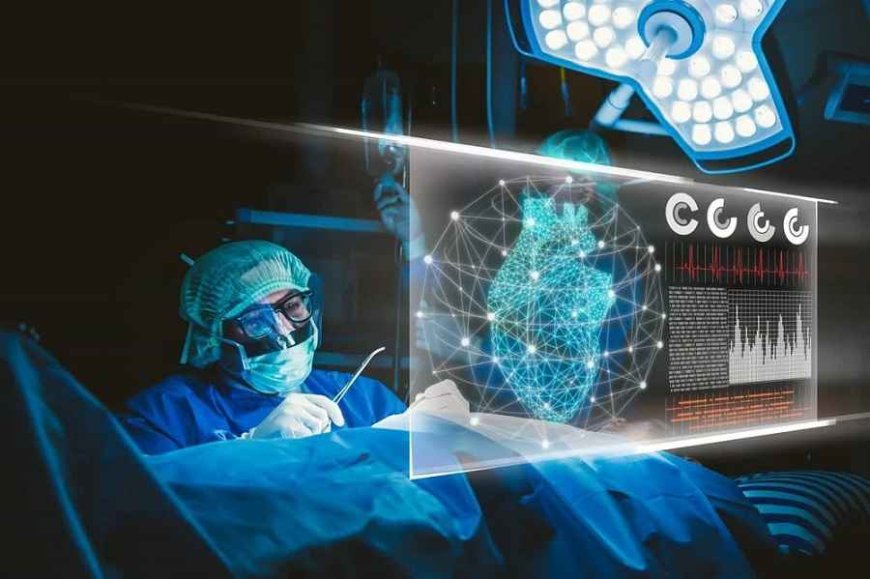Embrace the Power of AI Transforming Patient Care
In a world where technology is reshaping industries at an unprecedented pace, the healthcare sector is no exception.

In a world where technology is reshaping industries at an unprecedented pace, the healthcare sector is no exception. As we stand at the intersection of healthcare and technological innovation, Artificial Intelligence (AI) emerges as a transformative force, propelling healthcare strategies into a new era of efficiency, accuracy, and patient-centered care. From diagnostics to treatment, AI is revolutionizing the way healthcare is delivered and experienced.
The Dawn of AI in Healthcare
The incorporation of AI in healthcare is not a distant vision but an ongoing reality. Machine learning algorithms are capable of analyzing vast datasets, detecting intricate patterns, and generating insights that elude human observation. This potential has sparked a paradigm shift in healthcare strategies, as practitioners and policymakers recognize the immense benefits that AI can bring to patient outcomes, cost-effectiveness, and resource management.
Precision Diagnostics
One of the most notable areas where AI has made significant headway is in diagnostics. Traditional diagnostic methods are often time-consuming and may result in human error. AI-powered algorithms can process complex medical data, such as medical images and genetic sequences, with remarkable speed and accuracy. This allows for early detection of diseases like cancer, enabling timely interventions and improved survival rates. Moreover, AI-driven diagnostic tools contribute to personalized treatment plans, ensuring that patients receive the right interventions tailored to their unique medical profiles.
Predictive Analytics and Prevention
Healthcare strategies are shifting from a reactive model to a proactive one, thanks to AI-driven predictive analytics. By analyzing patient data and trends, AI can identify individuals at risk of developing certain conditions, such as heart disease or diabetes. Healthcare providers can then intervene with preventive measures, reducing the burden on both patients and the healthcare system. This shift towards prevention aligns with the broader goal of promoting population health and minimizing healthcare costs.
Enhancing Treatment Efficiency
In the realm of treatment, AI augments medical professionals' capabilities by offering insights that aid in decision-making. Treatment plans can be optimized based on a patient's medical history, genetic predisposition, and real-time data. Additionally, AI can assist in surgical procedures by offering guidance to surgeons, increasing precision and minimizing risks. Virtual health assistants powered by AI can engage with patients, offering medication reminders, answering questions, and even providing mental health support.
Managing Medical Records and Administration
AI streamlines administrative tasks that consume a significant portion of healthcare professionals' time. Electronic Health Records (EHRs) are being revolutionized by AI algorithms that can accurately transcribe medical notes, reducing paperwork and enhancing data accuracy. Natural Language Processing (NLP) allows for efficient extraction of critical information from medical narratives, enabling faster decision-making. This not only frees up healthcare providers to focus more on patient care but also minimizes errors due to manual data entry.
Challenges and Considerations
While the integration of AI in healthcare holds immense promise, it also presents challenges that demand careful consideration. Privacy and data security concerns are paramount, as patient information is highly sensitive. Ethical dilemmas surrounding decision-making by AI systems also require thoughtful exploration. Striking a balance between the capabilities of AI and the expertise of human healthcare providers is crucial to ensure that patient care remains compassionate, empathetic, and holistic.
The Role of Healthcare Professionals
AI is not replacing healthcare professionals; it is enhancing their capabilities. Physicians, nurses, and other healthcare providers are uniquely positioned to interpret AI-generated insights, contextualize them within a patient's medical history, and make informed decisions. The collaboration between human expertise and AI-driven technologies has the potential to create a synergy that elevates patient care to new heights.
The Future Landscape
As AI continues to evolve, the future of healthcare looks increasingly promising. Real-time monitoring devices, wearable technology, and remote patient management powered by AI are becoming integral to healthcare strategies. Telemedicine, bolstered by AI algorithms, enables consultations and diagnoses from anywhere in the world, democratizing access to healthcare. Moreover, AI-driven drug discovery is accelerating the development of new treatments, potentially revolutionizing pharmaceutical research and development.
Addressing Disparities
It's important to note that the integration of AI in healthcare should aim to bridge existing disparities rather than exacerbate them. Efforts must be made to ensure that AI technologies are accessible and effective across diverse populations. Strategies to address language barriers, cultural sensitivities, and varying levels of technology literacy are crucial to avoid perpetuating healthcare inequalities.
Collaboration for Success
The successful integration of AI in healthcare requires collaboration between technology developers, healthcare providers, policymakers, and patients. Robust regulatory frameworks that uphold patient rights and data privacy are essential. Continuous training programs can equip healthcare professionals with the skills needed to harness AI's potential effectively. Patient education and engagement play a pivotal role in building trust in AI-driven healthcare strategies.
The integration of AI in healthcare is not a futuristic fantasy but a rapidly unfolding reality. Healthcare strategies are undergoing a profound transformation, harnessing the power of AI to improve diagnostics, treatment, and overall patient care. As we navigate this technological evolution, it is imperative that we prioritize patient well-being, ethical considerations, and inclusivity. The synergy between AI and human expertise promises to redefine healthcare, ushering in an era where precision, accessibility, and compassion converge to enhance the quality of life for individuals around the globe.
